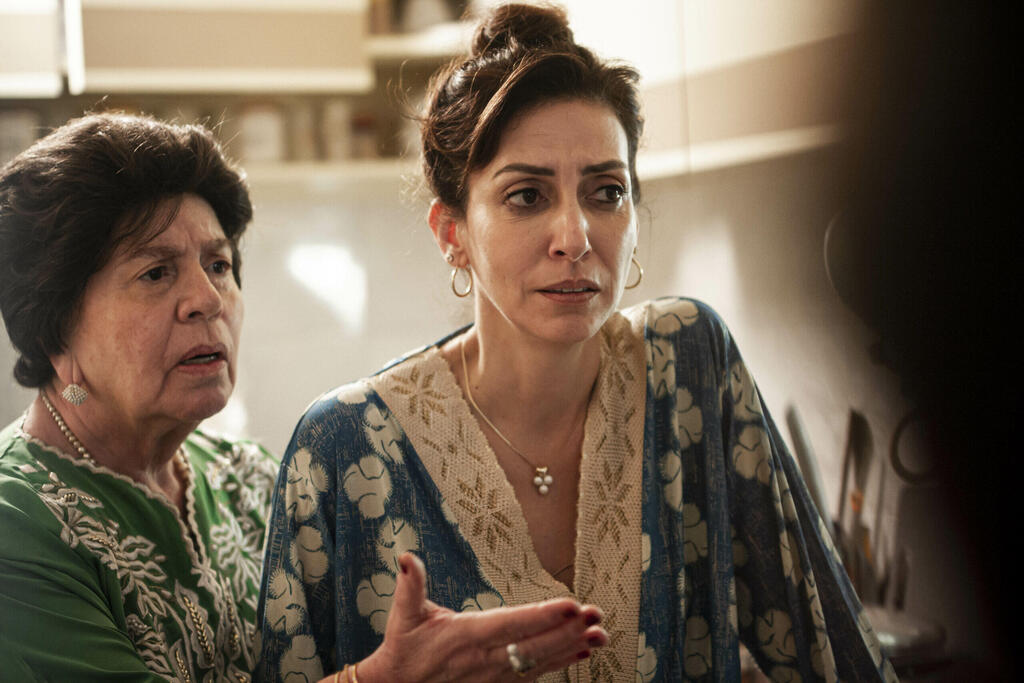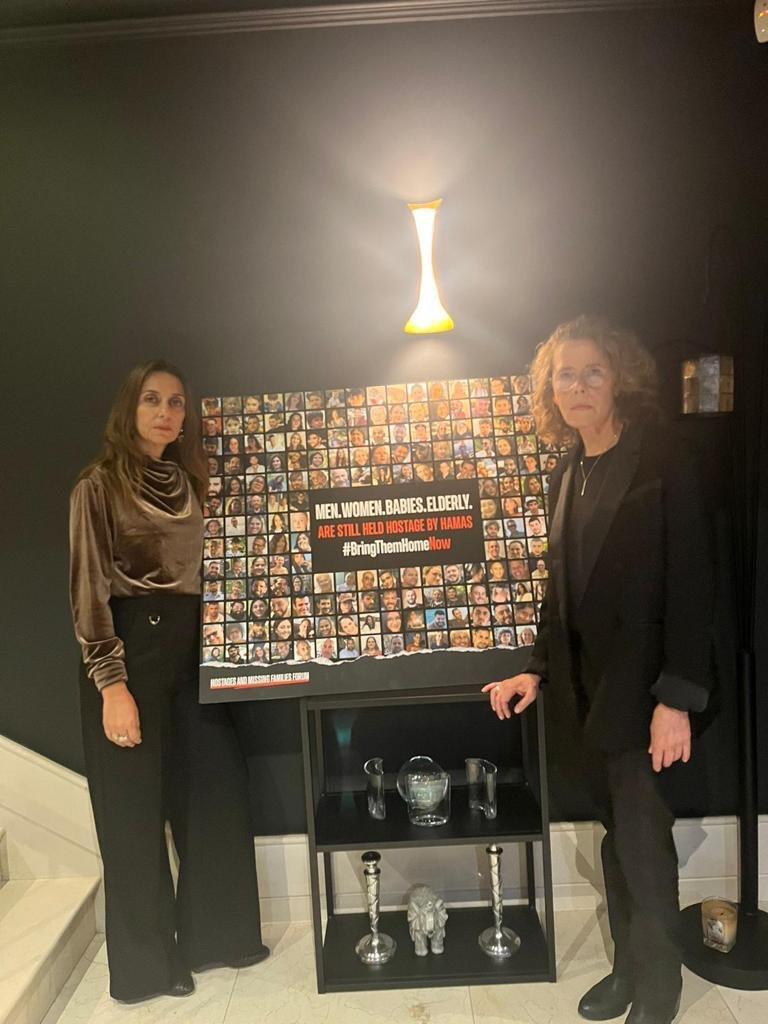Getting your Trinity Audio player ready...
Here's an interesting statistic: Israel has made it into the final nomination list ten times in the Best International Film category at the Oscar Academy Award ceremony, but has never won - there is no other country in the world with so many nominations but without having awarded a statuette.
More stories:
Here's another interesting fact: Joseph Cedar’s "Footnote" in 2011 represented Israel at the Oscars and marked an extraordinary five years, during which another Israeli film competed among the five finalists in four different ceremonies, but since then there has not been a single Israeli film that won the prize.
6 View gallery
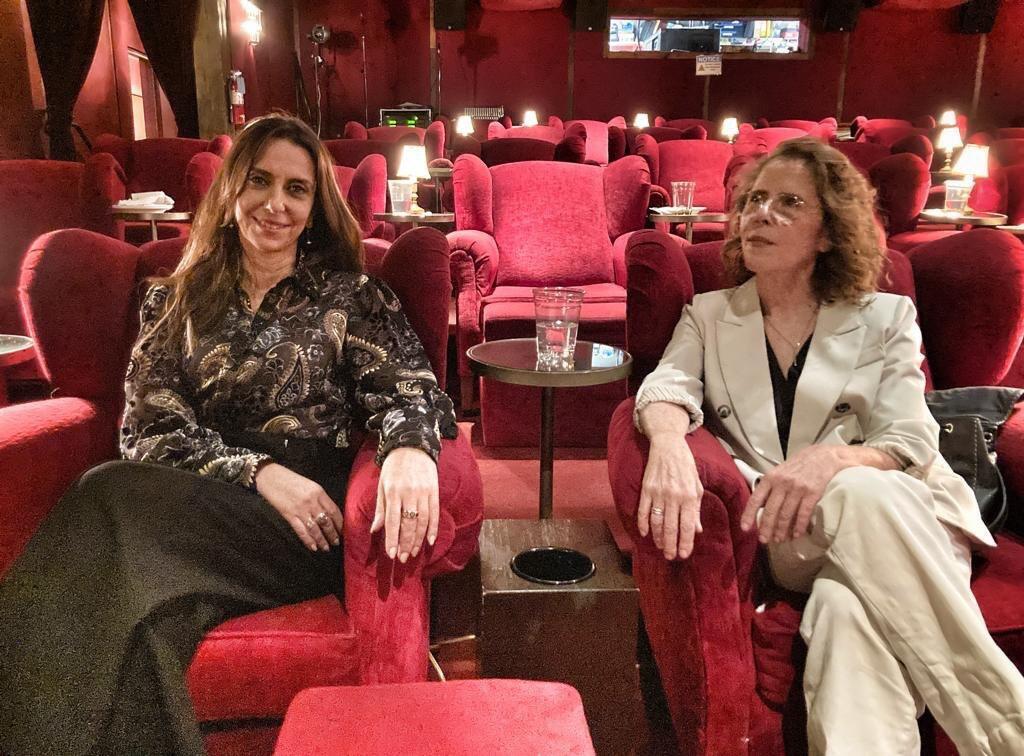

Eleanor Sela and Ayelet Menahemi at a screening of 'Seven Blessings' in the US
(Photo: Malo Zion)
So it may be true that the odds are still not in our favor on normal days and certainly not during wartime, but that doesn't stop "Seven Blessings" from trying anyway. The film of Ayelet Menahemi, who made a comeback after sixteen years since she directed "Noodle", was the big winner of the Ophir Awards ceremony - winning 10 of the 12 categories (the most wins since "Nina's Tragedies" in 2003) and was announced as the Israeli submission to the Oscar award.
It should be mentioned that campaigning for an Oscar is difficult and almost impossible - it requires time, patience, investment, adherence to the goal, quite a bit of luck and above all money, lots of money. Each winner of the best film prize at Israel's Ophir Awards is supposed to receive a grant of about NIS 300,000 for its Oscar campaign, but in the case of "Seven Blessings" the transfer of the amount was halted when the war broke out.
"The country sets its priorities at a time of war... we have no reservations. It was very clear that these would the consequences," Menahemi says in a conversation with Ynet. "And precisely at a time like this one must not give up culture. It's a matter of approach. It is quite understandable that at a time of an emergency the country would stop everything and go in only one direction, but still…"
Eleanor Sela, who wrote the script together with Reymonde Amsallem and also acts in the film, agrees and adds: "When we talked to donors, we reiterated our mantra, saying 'If you can donate with two hands, then with one you can donate to the war, to the soldiers and to the return of the hostages, and with the other hand you can donate for culture and education, so we don't continue to live by the sword."
6 View gallery
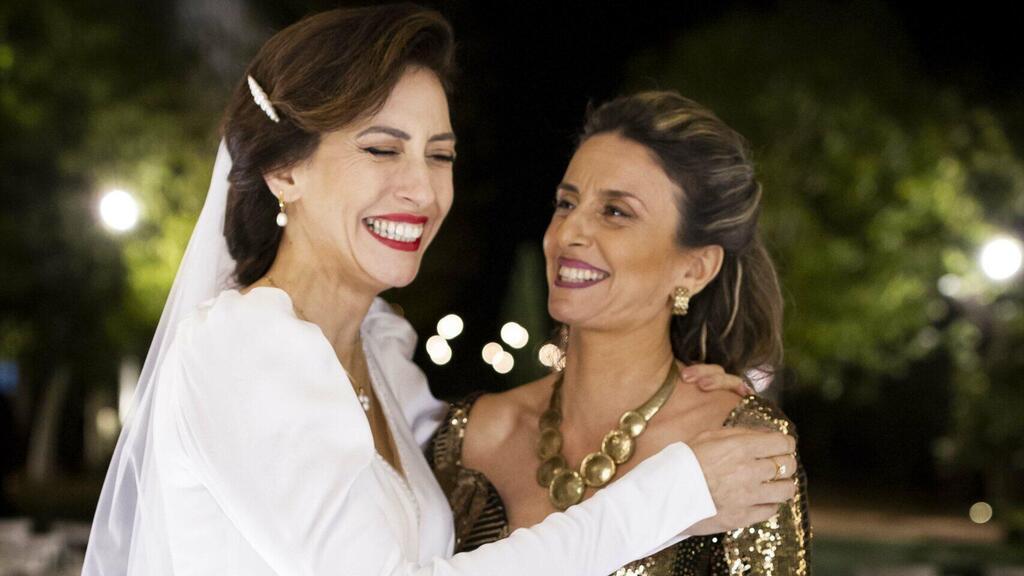

Reymonde Amsallem and Sela in 'Seven Blessings'
(Photo: Maria Brodkin, courtesy of United King Films)
"One can say that we started this campaign very hopelessly. We didn't even make a single 'check mark' on the things required for the campaign," Menahemi adds. "And that's exactly what motivated us. We didn't have a sales agent, which means that we had no international distribution - we didn't participate in any festival at all, which is very unusual. And we didn't have a budget - if you want to at least be noticed but you don't have all the references to back you up, you should at least put money on ads.
"We also didn't have celebrities or renowned figures who agreed to promote us, because everyone was busy, rightfully so, with something much more important. And others didn't want to get involved for fear of losing followers. There wasn't even a situation where they rejected us, it rather felt like we didn't exist and weren't there. Eventually, we received some support and help from our partners and from Jewish communities in the United States and London."
Until October 7, the film was a success in Israel and was viewed by more than a quarter of a million people, an impressive figure by all accounts and evidence of the audience's connection to this film. Now there is an opportunity to watch it again, or for the first time, as these days the film is back in cinemas.
Until that Saturday, Sela, Menahemi, Amsalem, producer Ronen Ben Tal and the entire cast of "Seven Blessings" felt that they had a real chance to surprise, and at least end up making the shortlist, which will be published in a little more than three weeks, on December 21. The shortlist includes 15 films in the category, and before the ceremony, the list is reduced again to five nominated films.
6 View gallery
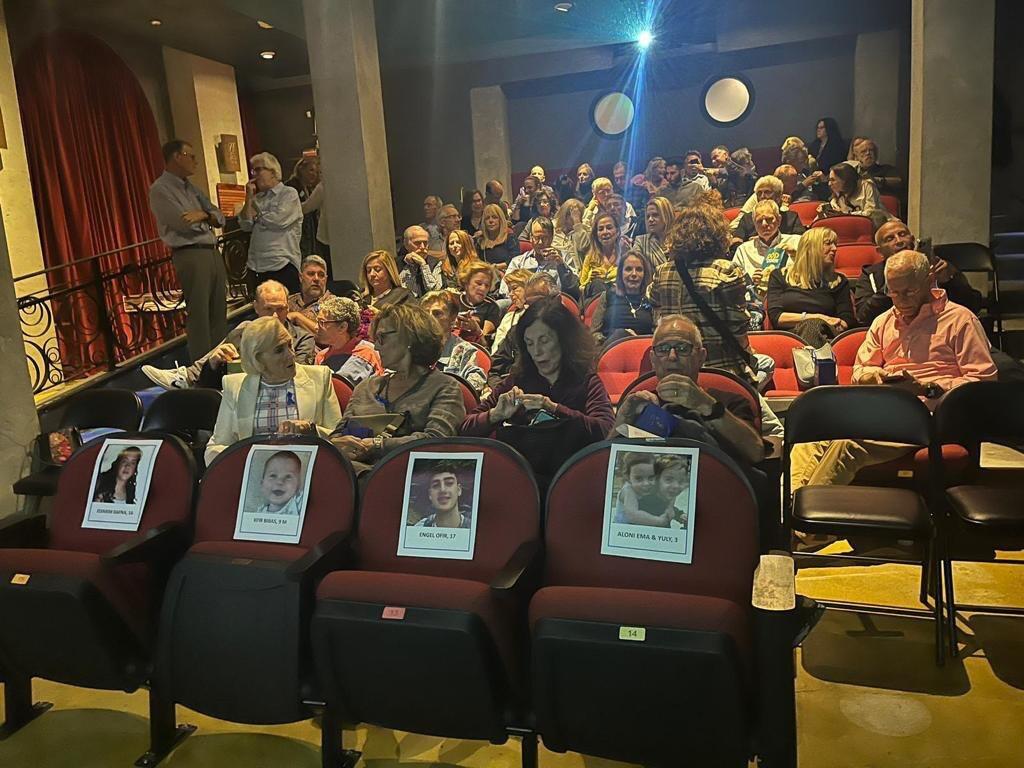

Screening of 'Seven Blessings' in the US, first-row reserved for hostages
(Photo: Malo Zion)
"Before the war, the talk here was that if there was any film that had a chance of this to happen, this was the one," Sela recalls. "And we wished for a fair fight. The world stopped just for us while all the other countries continue with their promotion."
"No one here remembered that there was a film at all. It slipped our minds. It felt like this film was buried on October 7 at 6.30 A.M., when the whole country changed," Menahemi describes the unusual situation. "There were two or three weeks of complete oblivion, and precisely when we decided to go and meet the evacuees from Kfar Aza, not even knowing what to anticipate, a plot twist happened."
The twist mentioned by Menahemi happened thanks to an encounter with several evacuees, one of whom is Liora Eilon, the mother of the late Tal Eilon, a member of the Kfar Aza community security squad, who was killed protecting the kibbutz on that same Shabbat.
"Women there came to us, saying - 'Bring us The Oscar, bring us this hope,'" says Sela. "After Liora watched the film, she wrote me an emotional and moving email, and I said to Ayelet, 'Okay, this is our emergency call-up, and we are going to represent Israel.'"
"There was such a sweep among the entire movie 'family'," Menahemi continues. "It was simply amazing. Mentally, I felt completely different. Because suddenly you have a role or a meaning again. It also changed our attitude - because beforehand it involved a very egoistic element, the feeling was that you are representing yourself; then suddenly, when it was restarted, we were thinking more in terms of: 'I want to represent my country', there was no other thought. I suddenly became a zealous patriot."
Sela adds: "We are pursuers of life, and in the end, without culture, without spirit, without soul we have nothing to look forward to here. What are we fighting for? To fight once again? We are fighting to live."
"And what if they really hate us out there?"
The conversation with them takes place a few days after they returned from an intensive two-week tour that included stops in New York, Miami, Los Angeles and London, aiming to screen the film to as many academic members as possible and create a positive buzz around it among the people who can help the film reach the red carpet at the Dolby Theater in LA in March next year, where the Oscar Award ceremony will be held.
Evidence of how much the "Seven Blessings" family that Menahemi and Sela are talking about is far more than a chewed up and meaningless phrase is the fact that during our conversation, Tiki Dayan – who won Best Supporting Actress Ophir Award for her role in the film - calls them, trying to understand what they were going through on their journey. "They can't believe we haven't talked to them yet," Sela says with a smile a moment after she promises Dayan that she will get back to her. "We updated them along the way. We are really connected."
They flew at a time when there was news about pro-Hamas demonstrations on college campuses in the United States, protests, more or less violent, that gradually spread throughout Europe - and when global public opinion began to forget about the atrocities of the October 7 massacre, and focused on criticizing the attack of Israel on Gaza.
"Before we flew there, Ayelet asked me, 'What if they really hate us there?'" Sela recalls. "So, I told her, 'They will meet us after they watch the film; it will be very hard to hate us after they watch it.' And that's what really happened. You can't remain indifferent to the humanity portrayed in it. It touched people everywhere. We took off believing that that this film can represent Israel."
The two went on their marathon of screenings with a clear purpose, while knowing that they could not disconnect themselves from the situation in Israel, the war in Gaza and the issue of the hostages that resonated everywhere they went.
The film tells the story of Marie (Amsalem), who has lived in France for years and returns to Israel to marry her true love (Eran Mor). Her family, according to the best tradition, organizes a week of festive meals to mark the happy event, while secrets and lies of the past are revealed, especially the fact that she was handed over from her mother Hana (Dayan), who was blessed with many children, to her infertile aunt Grazia (Rebecca Bacher); this was a common Moroccan custom in the 1950s, called "children's loan".
Unlike many films made in Israel and those that previously represented Israel at the Oscar Awards ceremony, this one has nothing to do with the army or the Israeli-Palestinian conflict, topics that are as relevant as ever these days, but reality has already made its connection to the plot and the script.
"At the end of the screening in New York, two Moroccans came to me and hugged me, crying with tears," says Sela. "And one of them told me, 'We are Muslim Moroccans.' And for a moment I held my breath, saying to myself, 'But he liked it, and we're good.' And this is worth everything. Ayelet always said that everyone during this war searched for ways to contribute. And this is something only we can do. No one has yet received the mandate to represent Israel with the film at the Oscars."
Was there talk about the war? How did it come up during the screenings?
Menahemi: "First, it came up because the film involves a family, it's about different narratives within a family, about forgiveness within a family, about acceptance, understanding, reconciliation, and Israel is now a family. This means - the analogy is required, not just requested. And it was very easy to compare it to what Israeli society is going through right now. The way people cope, the way they suddenly forget everything that preceded it and come together; it's something that really resonates in the film as well. It talks about how important it is to forgive - and on the other hand, today more than ever we feel that there are things that cannot be forgiven."
Sela: "At the moment the film can be considered a kind of compass. It ends with the words 'Look for forgiveness within yourselves' – in fact, open up your heart and you will find it there. And I say to the one who wrote it, to myself, 'Wait a minute, I open up and there is no forgiveness'; even more than that, it is clear to me that sheer evil should not and cannot be forgiven. In the end, in principle, I know that this should be the compass, in the end we want to lead our lives here with humanity. And suddenly things changed for us as creators, in our mind, consciousness, and perception. It was impossible to separate the film from the reality."
You are in a situation similar to the one Ukraine was in before the Eurovision Song Contest in 2022 - when the war broke out there and it was clear to everyone that they were going to win, even before they knew who would represent them. How will this effect apply in your case?
Sela: "It may be very helpful and equally it may be very disturbing, but I would very much like this discussion to be irrelevant to the film. I would very much like to win because this film is good and worthy, and to not win if it is not good. I do not live in a vacuum and I know it can affect one way or the other, but it's also part of my worldview - if there are two sides, I'll always look at the side that wants to like it and wants it to help."
Menahemi: "And I will look at the other side."
Sela: "That's why it works so well."
Menahemi: "It's very balanced, but tends to be on her side, simply because she's much more convincing and I'm just scared and looking for where they hate me. She is the secret weapon of our campaign and carries us forward with her uncompromising faith. I was constantly scared by advocacy matters. I don't have the tools to deal with Hasbara. There are people whose job it is to man the barricades and return fire properly, sharply, and efficiently. There are also ways to bypass that, to surprise and attack it from other places. That's why I think it's the right time for the film 'Seven Blessings' to go around and make people open their minds and hearts."
Sela: "We understand that we are also part of the war effort, the war on consciousness, which eventually is the most important war - because in consciousness all evil and all good begins."




